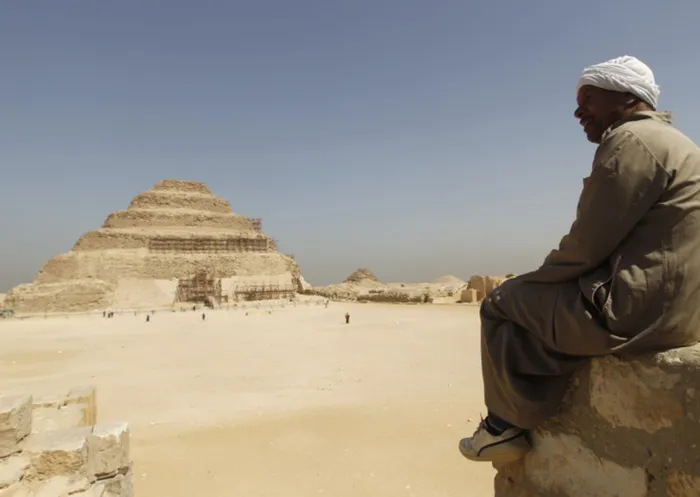Egypt's c/a gap expected to double

A guide sits on a stone as he looks at the Djoser's step pyramid in Saqqara, outside of Cairo March 5, 2011. Sites around the great pyramid at Giza, a Wonder of the Ancient World, the Sphinx and the cemetery at Sakkara have been nearly empty of tourists since a revolt started a month ago that ousted Hosni Mubarak and now Egypt wants visitors to return. REUTERS/Peter Andrews (EGYPT - Tags: CIVIL UNREST POLITICS TRAVEL SOCIETY) A guide sits on a stone as he looks at the Djoser's step pyramid in Saqqara, outside of Cairo March 5, 2011. Sites around the great pyramid at Giza, a Wonder of the Ancient World, the Sphinx and the cemetery at Sakkara have been nearly empty of tourists since a revolt started a month ago that ousted Hosni Mubarak and now Egypt wants visitors to return. REUTERS/Peter Andrews (EGYPT - Tags: CIVIL UNREST POLITICS TRAVEL SOCIETY)
Cairo - Egypt's central bank said on Saturday it expected its current account deficit in the January to March quarter to double to $3-billion from the July-December 2010 deficit of $1.4-billion due to political turmoil.
Egypt's current account deficit widened 9.2 percent year-on-year to $1.4-billion in July to December 2010 from a current account deficit of $1.3-billion in the same period in 2009, the central bank said.
The central bank said the January to March quarter deficit would widen owing to a fall in tourism revenues, remittances from workers abroad and foreign investment due to fallout from the turmoil that toppled of Hosni Mubarak on Feb. 11.
“It is expected that the balance of payments at the end of the third quarter of the current financial year which ends on March 31, will register a deficit of more than $3-billion,” the central bank said in a statement
Egypt's financial year runs to June 30, so it considers the period January to March as the third quarter of the fiscal year.
In the period July to December 2010, the bank said imports grew faster than exports and investment income shrank.
It reported a rise in imports of 10.9 percent to $26-billion dollars, due to a 33.6 percent rise in petroleum imports, and non-petroleum imports by 8.5 percent. Exports rose by about 10 percent.
Investment income decreased 58.3 percent to $211-million from $506-million in the same period of 2009, it said.
Tourism revenues in July-December grew 15.6 percent to $6.9-billion in July-December 2010, the statement said, adding that transfers, including remittances from abroad, increased 45.3 percent to $6.3-billion and and Suez Canal revenues rose by 10.9 percent to $2.5-billion.